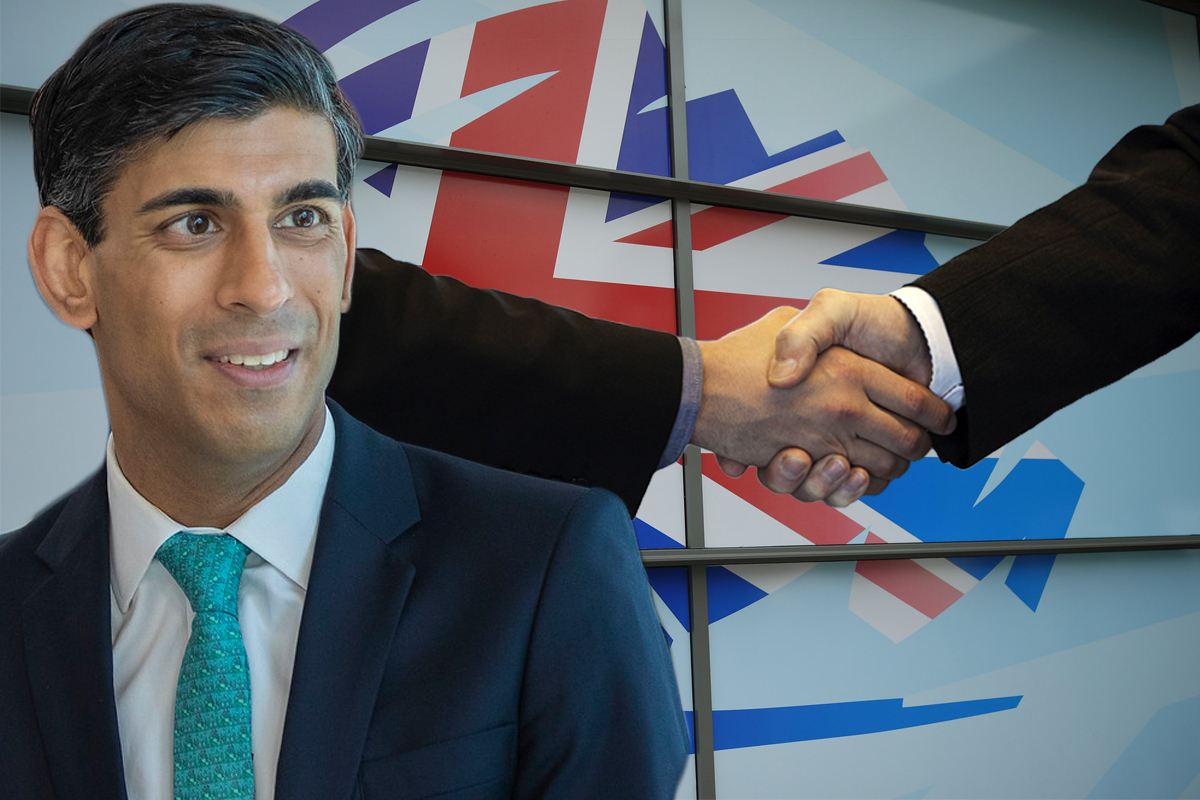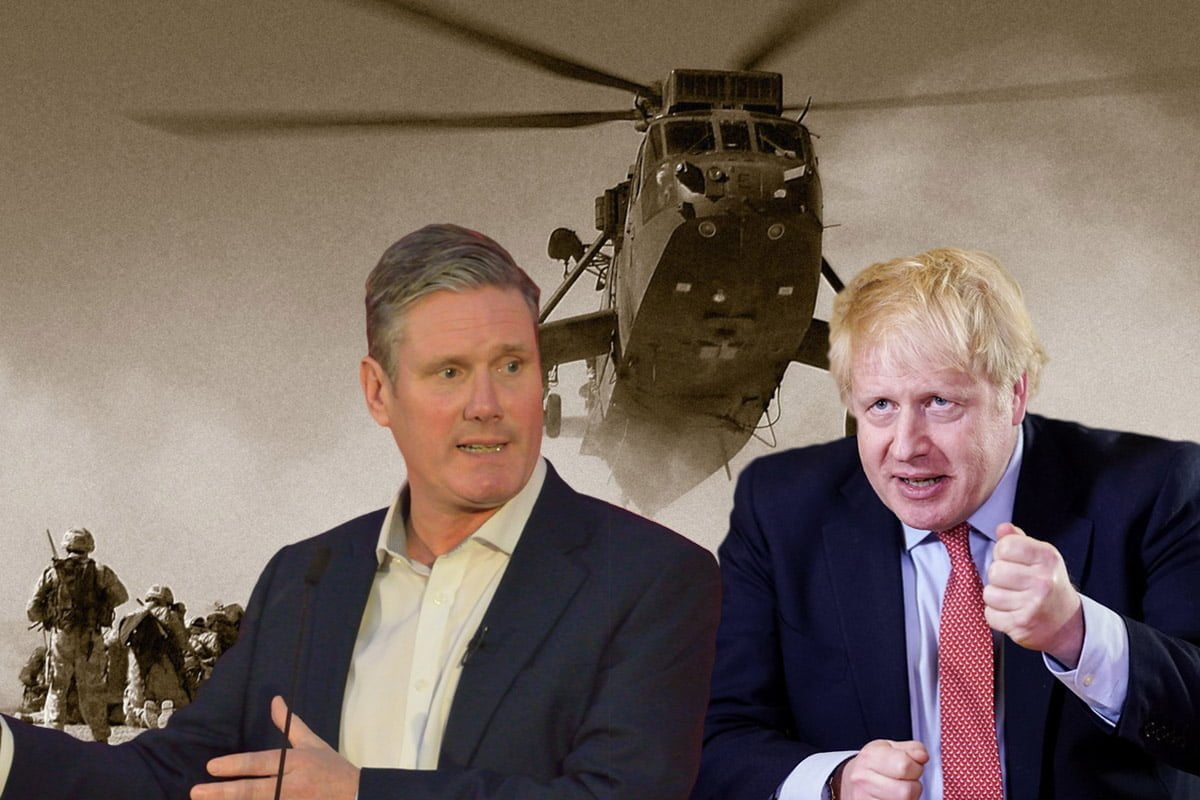With delusions of grandeur in relation to the strength of British imperialism, Johnson and the Tories have announced a massive increase in military spending. Starmer has scandously accepted this. Labour must call for welfare, not warfare.
Last month, Boris Johnson grandly announced a £16.5 billion rise in UK military spending. This increase – the biggest in 30 years – would make Britain the biggest military spender in Europe.
The funds will largely be used to buy weapons like combat drones and fighter jets, establish a new artificial intelligence center, and create a Royal Air Force Space Command.
Much like how the Tories have handed COVID-19 contracts to their chums in big business, the main beneficiaries of this announcement are arms contractors with strong links to Tory ministers.
In fact, there is a revolving door of ex-defence secretaries and architects of British foreign policy becoming advisers at leading arms and security companies. Between 1996 and 2012, over 3,500 MoD staff and senior military officers went on to work for arms companies.
Priorities
 It’s unsurprising, therefore, that there’s always a magic money tree when it comes to handing out lucrative contracts to companies like BAE systems.
It’s unsurprising, therefore, that there’s always a magic money tree when it comes to handing out lucrative contracts to companies like BAE systems.
Adding insult to injury, this government announcement was soon followed by another – that from Tory Chancellor Rishi Sunak, stating that 1.3 million public sector workers must accept a pay freeze next year.
This also comes after the Tories rejected the proposal to extend free school meals to children going hungry during the school holidays. These cruel and callous decisions have no doubt lit the fuse for explosive events in the coming period.
Puffed-up
Johnson declared that “defence of the realm must come first”, ultimately with the aim to “extend British influence”. He said that this military spending represented the “end of an era of retreat”; an attempt to reverse the century-long decline of Britain as a global imperialist power.
What’s more, with Brexit fast approaching, Johnson and the Tories are desperately puffing up their chest in order to seek trade deals. But the weakness of British capitalism and the military – ironically because of Tory budget cuts – means the days of ‘Rule Britannia’ are far behind us.
Grovelling
 Scandalously, rather than oppose this Tory jingoism, Labour leader Keir Starmer has backed it. His only concern is how it will be funded, and how proposed cuts to foreign aid will be managed.
Scandalously, rather than oppose this Tory jingoism, Labour leader Keir Starmer has backed it. His only concern is how it will be funded, and how proposed cuts to foreign aid will be managed.
So long as the capitalist class controls the economy and the state, however, foreign policy will simply be an extension of domestic policy – namely the maximisation of their profits by any means necessary. The cuts to foreign ‘aid’, alongside this increase in direct military spending, simply represent a shift from ‘soft’ imperialist power to ‘hard’ imperialist power.
Starmer and his shadow foreign secretary, Lisa Nandy, are grovelling before the ruling class in order to win their confidence and demonstrate that they have broken with Corbyn’s anti-war policies.
Both Starmer and Nandy have promised that, on their watch, Britain would “show global leadership” and be a “force for good in the world”. Good for the profits of the imperialists, no doubt!
Starmer is seeking to rebrand Labour as the party of ‘national security’, defending the interests of British imperialism. In practice, this has meant the leadership whipping Labour MPs to abstain on the Tories’ Overseas Operations Bill, which seeks to exempt British troops from prosecution in relation to actions undertaken abroad.
The left-wing internationalism seen under Corbyn’s tenure has been discarded for patriotic rhetoric, which the leadership hope will win back the ‘Red Wall’. They clearly misremember the New Labour years – because it certainly wasn’t the working class cheering on Blair’s interventions in Iraq and Afghanistan!
Re-tool
 The Labour Party and the wider labour movement should firmly oppose any moves to strengthen British imperialism. Instead, the labour movement must argue for investment in socially useful projects.
The Labour Party and the wider labour movement should firmly oppose any moves to strengthen British imperialism. Instead, the labour movement must argue for investment in socially useful projects.
The vast technology and science developed for war could instead be harnessed for the good of society. This was understood well by the workers at Lucas Aerospace Corporation.
In 1976, the Lucas shop steward’s committee responded to redundancy announcements with a plan of how to convert the company’s factories from producing weapons to socially useful products.
But the capitalist class profit immensely from war, and will not divest away from arms spending of their own accord.
At the end of the day, we cannot plan what we do not control; and we do not control what we do not own. We therefore need democratic workers’ control of the economy – of our industries and workplaces – so that the money and resources reserved for war can be used to bring real security to society, by ensuring that everyone’s needs are met.
Capitalism and war are intrinsically intertwined. Only a socialist solution can cut across this destructive symbiosis.






